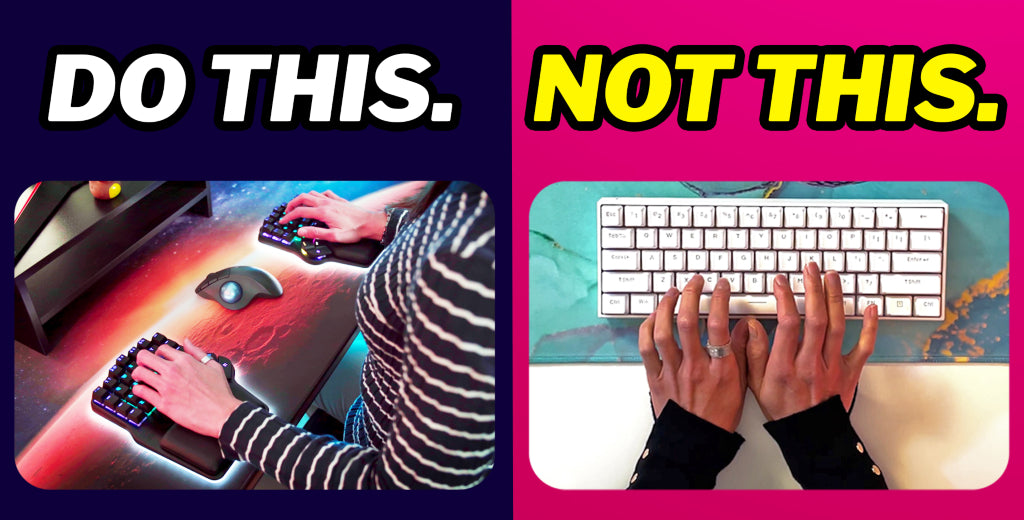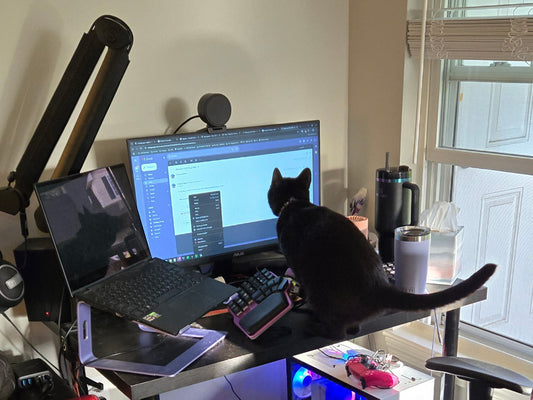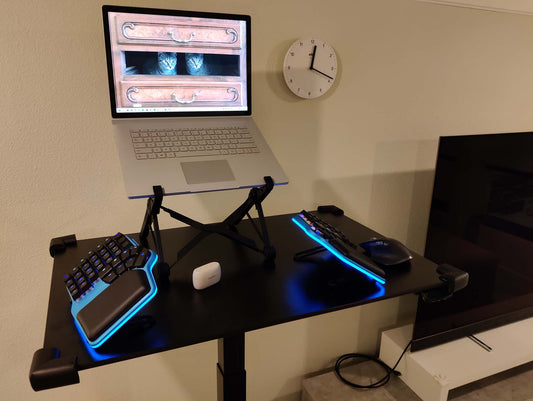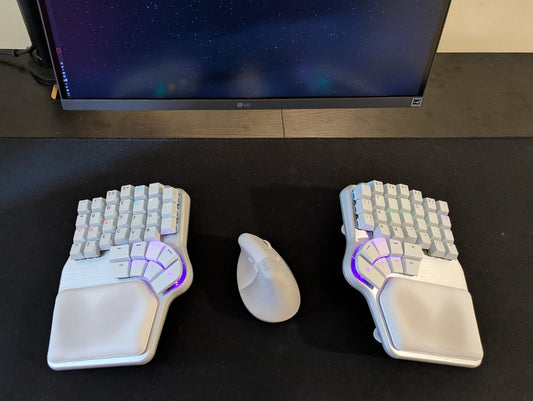Do you suffer from lower back pain? Are you a victim of rounded shoulders? Or do you walk around with an overextended neck like Mr. Burns?
These are some common postural problems for those who spend time working from a desk, and even though they may not affect you now, they may be something that affects you in the future.
But don't worry, the tips in our video can help you fix yo' sh*t.
Way back when we first built our keyboards, we had a few things in mind.
Obviously, we wanted them to look flashy when placed on your desk, but we also wanted to give our users much more effectiveness and comfort. And we wouldn't be doing our job if we didn't regularly give tips on how to master your keyboard and desktop ergonomics, right? So there's no better way to start than to take it from the top - quite literally, we're going to start with the neck.
Habit nº1: no more neck pain

Neck pain is kind of a big deal, and it's pretty clear that neck pain is generally caused by bad posture, especially when seated at a desk.
How's your neck right now? Is it in line with your spine, or are you leaning your head forward to the screen? You may find that when looking at your monitor, TV, or cell phone, you increase the strain on your neck by extending your head too far forward.

Over time, this is going to lengthen the muscles in your upper back and neck while tightening those in your chest. And that's not good, Dygmates.
To have a correct posture, aim to tuck that chin a little bit and line your neck up with your spine.
Setting your monitor height so that the top is at the same level as your eyes, placed between 50 to 100 centimeters away, can help.

A great habit to keep in mind is to regularly check your posture by placing a camera directly on your side. Ideally, the crown of your head, neck, spine, and tailbone should all line up.
If you find your posture isn't improving over time, some regular chest stretches and upper back exercises can help correct those muscle imbalances in your neck.

Habit nº2: avoid back pain

Did you know that the shoulder joint is the most complex joint in your body? They allow us to move our arms in almost any direction we like.
But being so complex can come with a tonne of potential issues: rounded shoulders, for one, are becoming all too common.

Again, those who spend long hours typing at a desk fall into the habit of gradually rounding off their shoulders over time.
Traditional keyboards certainly don't help, as they require you to keep your hands in a close-together typing position throughout the day. This is one of the primary reasons we built a split-design keyboard.
By placing each half of your keyboard to match your shoulders' width, you'll create a more open-chested, less-rounded typing posture and take a lot of pressure off your elbows and upper back.

Take a short posture break from your desk every hour or two, even if you're using a split keyboard. Find a wall and perform ten slow wall slides.
These will open your chest, strengthen your back, and wake you up almost as much as a cup of coffee.

Habit nº3: forget the pain in the wrists and hands

Moving further down the body, let's focus on those wrists and hands.
They're known as radial and ulnar deviation. However, these motions are pretty harmless in the short term, but when repeated thousands of times a day, plenty of problems can arise - such as inflammation, chronic pain, and even arthritis.
On a traditional keyboard, high-use keys such as shift, enter, delete, and backspace all encourage ulnar deviation.
Thanks to our programmable thumb keys, you can say goodbye to all that repetitive strain. These high-use keys can simply be moved to a more comfortable spot that relies purely on the power of your thumbs.

Sure, programming your keys to better locations on your keyboard is one thing. But to reach ultimate wrist comfort Nirvana, you want to make sure your hands move as little as possible.
You can easily find great touch-typing exercises on the Internet, use them!

Instead of scrolling on your Instagram feed watching whatever it is you watch... Use that time - 5-10 minutes a day - to work on your touch typing. Putting a reminder on your phone can also help a lot.
Habit nº4: prevent hand pronation

When using a traditional keyboard, you type with the palm of your hands facing down. And it's the same when using a regular mouse!
Again, this position would rarely cause any issues over short periods of time. However, being like this for 8 hours a day, 5 days a week, 240 days a year, and BOOM, you might begin to acquire some wrist and hand problems.
This is mostly because the bones in your forearm, the radius, and the ulna cross over and create added strain on the forearm and wrist. This could lead to joint pain, finger numbness, and even carpal tunnel syndrome.
Ideally, your hands should be in a natural position. That's why we added tenting to our keyboards!

Tenting takes a tonne of pressure off the forearms and wrists, allowing you to type in a more natural position. Both the Dygma Raise 2 and the Dygma Defy can be tented to up to 60º degrees and have up to 10º of negative tilting, allowing you to find your tented typing sweet spot.
If you're suffering from any wrist pain, investigate using a tented keyboard and a vertical mouse!
We did an extensive review of different vertical computer mice in another video. Make sure to check it out!
And while on the topic of tenting, don't let your desk turn into a campsite 🏕️
Habit nº5: say goodbye to your messy setup

Surprise, what you call an "organized mess" everyone else just calls a mess. And it's certainly no good for ergonomics. A messy desk forces you to place the mouse and keyboard in funky positions, just like pitching a tent at Glastonbury.
Remember that all sorts of strange wrist, neck, and head tilting can eventually end up giving you a completely avoidable injury.
Do your best to keep your mouse and keyboard in optimal positions throughout the day despite the mess.

Take two minutes at the end of every day to quickly clean your desk. It's worth the little time. And a lot can be accomplished in 2 minutes!
Use the power of community to build ergo-habits
In a world where the desktop workforce is stronger than ever before, we all deal with the same battles, postural problems, injuries, and hindrances. If you're struggling with desktop ergonomics, we guarantee you're not the only one! Use the power of this larger-than-ever-before community on Discord to discuss the ergonomic problems you face.









